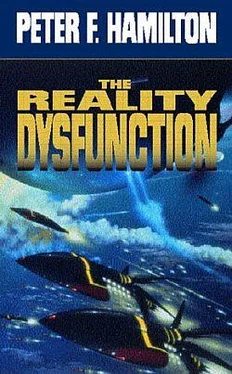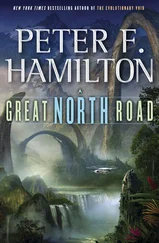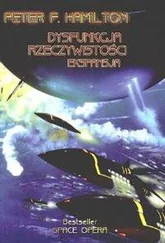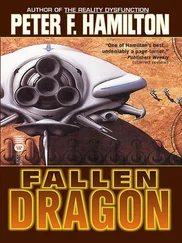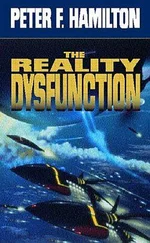In fact there were times when he questioned the whole point of the ESA mounting an operation on what was basically a jungle populated by psychological Neanderthals. But Lalonde was only twenty-two light-years from the Principality of Ombey, the Kulu Kingdom’s newest dominion star system, itself only just out of stage-two development. The ruling Saldana dynasty wanted to make sure that Lalonde didn’t mature along hostile lines. Ralph and his colleagues were assigned to watch the colony’s political evolution, occasionally offering covert assistance to aspirants with coincident policies; money, or black data on opposing candidates, it didn’t make any difference in the end. The formative years of a colony’s independence set the political agenda for centuries to come, so the ESA did its best to make sure the first elected leaders were ideologically benign as regards the Kingdom. Placemen, basically.
It made sense if you took the long-term consequences into account; a few million pounds spent now as opposed to the billions any form of naval action would cost once Lalonde had a technoeconomy capable of building military starships. And God knows, Ralph thought, the Saldanas approached every problem from that angle—with their life-expectancy long term was the only term they understood.
Ralph smiled pleasantly at Maki Gruter. “Anyone of any interest in this batch?”
“Not that I can see,” the civil servant said. “All Earth nationals. Usual Ivet types, waster kids dumb enough to get caught. No political exiles, or at least, none listed.” Behind his head, the screen displaying the vectors of Lalonde’s miserly orbital traffic showed another spaceplane docking with the vast colonist-carrier starship.
“Fine. I’ll have it checked, of course,” Ralph said expectantly.
“Oh, right.” Maki Gruter’s mouth twitched in a half-embarrassed grin. He pulled out a processor block and datavised the files over.
Ralph observed the information flood into his neural nanonics, assigning it to spare storage cells. Tracer programs ran through the fifty-five hundred names, comparing them to his primary list, the most troublesome of Earth’s political agitators known to the ESA. There was no match-up. Later he would datavise the files into a processor block, running a comparison with the huge catalogue of recidivist names, facial images, and in some cases DNA prints which the ESA had trawled from right across the Confederation.
He glanced out through the window again to see a group of the new arrivals slogging along the mushy road which led down the side of the square of grass and straggly roses which passed for the embassy gardens. The rain had arrived, drenching them in seconds. Women, children, and men with their hair beaten down, jump suits clinging to their bodies like a dark, crinkled, lizard hide, all looking thoroughly wretched. There might have been tears on their faces, but he couldn’t tell with the rain. And they still had another three kilometres to go before they reached the transients’ dormitories down by the river.
“Christ, look at them,” he murmured. “And they’re supposed to be this planet’s hope for the future. They can’t even organize a walk from the spaceport properly, none of them thought to take waterproofs.”
“Have you ever been to Earth?” Maki Gruter asked.
Ralph turned away from the window, surprised by the younger man’s question. Maki was normally keen to simply collect the money and run. “No.”
“I have. That planet is one giant hive queen for misbegottens. Our noble past. Compared to that, what this planet offers in the way of a future doesn’t look so bad.”
“Yeah, maybe.” Ralph opened a drawer and took out his Jovian Bank credit disk.
“There’s someone else going upriver with this batch of colonists,” Maki said. “My office had to arrange a berth for him, that’s how I know.”
Ralph stopped in the act of authorizing the usual three-hundred-fuseodollar payment. “Who’s that?”
“A marshal from the Sheriff’s Office. Don’t know his name, but he’s being sent up to Schuster County to scout round.”
Ralph listened to Maki Gruter explain about the missing homestead families, his mind running over the implications. Somebody in the Governor’s Office must consider it important, he thought, there were only five marshals on the planet: combat specialists with nanonic-boosted metabolisms, and well armed. Colony Governors deployed them to sort out severe problems, like bandits and potential revolts, problems that had to be eliminated fast.
Another of Ralph’s briefs was to watch for pirate activity in the Lalonde system. Prosperous Kulu with its large merchant fleet was engaged in a constant battle with mercenary vessels. Undisciplined, under-policed colony planets with woefully deficient communications were an ideal market for stolen cargoes, and most of the immigrants were at least bright enough to bring a credit disk primed with fuseodollars. The contraband was invariably sold deep in the hinterlands, where dreams soured within weeks when it became clear just how tough it was to survive outside the enclosed comfort of an arcology, and nobody was going to question where sophisticated power hardware and medical packages came from.
Perhaps those families had questioned the source of their windfall?
“Thanks for telling me,” he said, and upped the payment to five hundred fuseodollars.
Maki Gruter smiled in gratitude as his credit disk registered the financial bonus. “My pleasure.”
Jenny Harris came in a minute after the transport manager left. A thirty-year-old ESA lieutenant, on her second off-world mission. She had a flat face, her nose slightly crooked, with short dark ginger hair, and a slim figure which belied her strength. Ralph had found her a competent officer in the two years she’d been on Lalonde, if a little bit too rigorous in applying agency procedure to every situation.
She listened attentively as Ralph repeated what Maki Gruter had told him.
“I haven’t heard any word on unexplained hardware appearing upriver,” she said. “Just the usual black-market activity, selling off the gear which the spaceport crews lift from new colonists.”
“What assets have we got up in the Schuster area?”
“Few,” she said reluctantly. “We mainly rely on our contacts in the Sheriff’s Office for reports on contraband, and the boat crews fill in a bit more of the picture. Communication is the problem, naturally. We can give our upriver assets communication blocks, but the Confederation Navy satellites would spot any transmissions even if they were prime encrypted.”
“OK,” Ralph nodded. It was an old argument, urgency against exposure risk. At this stage of its development nothing on Lalonde was considered urgent. “Do we have anyone going upriver?”
Jenny Harris paused as her neural nanonics reviewed schedules. “Yes. Captain Lambourne is due to take a new colonist group upriver in a couple of days, they’re settling land just past Schuster itself. She’s a good courier, I use her to collect reports from our in situ assets.”
“Right, ask her to find out what she can, about the missing families and whether or not there’s been any unexplained equipment appearing up there. In the meantime I’ll contact Solanki, see if he’s heard anything about it.” Kelven Solanki worked at the small Confederation Navy office in Durringham. Confederation Navy policy was that even the humblest of colony worlds was entitled to the same degree of protection as any of the developed planets, and the office was supposed to be visible proof of that. To underline the fact, Lalonde received a twice-yearly visit by a frigate from the 7th Fleet, based at Roherheim, forty-two light-years away. Between visits, a flock of ELINT sensor satellites watched over the star system, reporting their observations directly to the navy office.
Читать дальше
